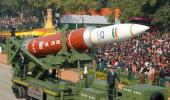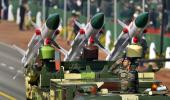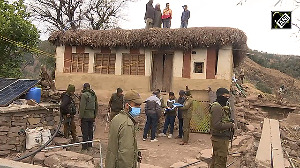'While all would agree on the need to be ready to launch cross-border strikes on terror camps, there is sharp disagreement on how best to do it.'
'Through IAF fighters, or surface-to-surface missiles?'
'Or should army Special Forces be created to do the job?'
'If air strikes are the agreed priority, additional funding must be made available for the purchase of fighters and missiles.'
'If it is to be Special Forces, the army must be facilitated in raising a Special Forces Command,' notes Ajai Shukla.

When Union Finance Minister Nirmala Sitharaman, while delivering her Budget speech, shared no details of how much she was allocating to defence, the writing was on the wall: There was going to be only a token rise.
This apprehension proved valid when the numbers appeared and it emerged the government had raised defence spending by an unusually low 5 per cent -- insufficient to cater even for inflation.
The government has made it clear that it prioritises spending on education, healthcare and creating national infrastructure, as a result of which the share of the military in the Centre's overall allocations has steadily fallen from 17.4 per cent in 2018-2019; to 16.6 per cent in 2019-2020 to 15.5 per cent in 2020-2021.
It is hard to argue for greater defence spending when the country's children are stunted from malnutrition, deprived of medical facilities, its youth barely educated and inadequately skilled for remunerative employment.
Given that, it should be self-evident that lacking the economic resources to be a dominant military power, we cannot keep waving the flag of unbridled nationalism.
It is folly to hubristically compare ourselves to China, talk down to Pakistan, inflame the internal situation in Kashmir and sow divisions within our society, thus weakening ourselves from within.
Instead, once clear about what we can afford to spend on defence, we must tailor our external affairs and internal politics accordingly.
Meanwhile, since defence remains the government's largest expenditure head, we must diligently debate and explore every avenue to get the most bang for the buck.
A key element of this is the urgent need for military manpower reform.
The most striking figure in the Budget was that, unprecedentedly, more money was allocated for army pensions (Rs 113,278 crore) than for army salaries (Rs 111,294 crore).
Incredibly, the government will spend less on its present soldiers and more on those (including myself!) who have gone home.
This is not to argue for the neglect of veterans who -- as self-described nationalists would trumpet -- have 'given their best years to the motherland' and now need our support.
Rather, it is a moment to remind ourselves that giving all those years to the nation has been a loss to the economy (in productive employment), as well as to the military (in pension liability incurred).
With national service ('the draft') seen as undesirable in India, partly to avoid a militarised population, many expert committees have concluded that the answer lies in switching to a 'short service' system, where soldiers join for three to seven years and then retire without pension to join the labour force.
However, vested interests have ensured this never comes about.
Typically, successive governments have dealt with the bloated pension bill by pretending it is somehow separate from the defence Budget.
The defence ministry, in its official statement after the Budget, stated: 'Rs 337,553 crore has been allocated for defence (except defence pensions).'
While literally correct, this semantic separation reflects an unwillingness to understand and internalise that the pension budget is, and always will be, shaped by the manpower policies created and followed by serving generals.
The new Chief of Defence Staff must focus on this, having already set a few manpower reforms in motion during his tenure as army chief.
Manpower reforms must also include the outsourcing of every possible logistical and maintenance function to civilians, given that civilian manpower costs are far lower.
Plugging the military into civilian logistical infrastructure also provides a boost to local economies around military bases, gives citizens a real stake in the military, and generates employment opportunities for retired servicemen who get re-employed by the commercial logistical enterprises that service the military.
In the United Kingdom, for example, most Royal Air Force aircraft are maintained and repaired by ex-RAF personnel on contract.
Another urgent budget-related priority must involve the coherent distribution of funds between the three services.
An analysis reveals that, year-after-year, each of the three services -- the army, navy and air force -- continue getting broadly the same share of the defence budget, and they continue spending it the same way, regardless of changes in their role, technology or environment.
Each year, the army gets about two-third of the entire defence pie and it spends almost three-quarters of it on salaries and pensions, leaving a little over 10 per cent for capital procurement (of modern weaponry), with the remaining going on running expenses.
The navy and air force, being less manpower-intensive, can devote about half their overall allocation on new weaponry.
The problem is that this distribution is not done on the basis of calculated priorities, where the generals, admirals and air marshals sit down together and decide what operational capabilities they need to create, and how. Such a process is not easy.
While all would agree on the need to be ready to launch cross-border strikes on terror camps, there is sharp disagreement on how best to do it: Through IAF fighters, or surface-to-surface missiles? Or should army Special Forces be created to do the job?
If air strikes are the agreed priority, additional funding must be made available for the purchase of fighters and missiles.
If it is to be Special Forces, the army must be facilitated in raising a Special Forces Command, with the necessary wherewithal.
In reality, however, what happens is that the services prepare their financial projections on the basis of what they were allocated the previous year.
The defence ministry cuts that down by an average of 30 to 35 per cent. The finance ministry then pares that down further before making the allocation. And the outcome is that, each year, each service is allocated a little more than it was in the previous year, but with roughly the same inter se proportion.
Finally, given the understandable limitations on how much money the government can allocate to 'non-productive' expenditure on defence, there is a dire need for out-of-the-box thinking on creative ways to fund defence modernisation.
Actually procuring the modern equipment listed in the military's wish list -- the 15-year Long Term Integrated Perspective Plan -- will require the government to cough up about Rs 13 trillion over and above what can be expected from the defence capital budget, at current growth rates.
A step has been taken towards this by mandating the 15th Finance Commission to consider new funding mechanisms for defence and internal security.
Under consideration are options that include floating long-term defence bonds, selling part of the military's vast land bank (next to the railways, it is the country's largest land holder) and even levying a defence cess on income tax -- something that would be hard to sell even in these nationalistic times.
At any rate, the need for unorthodox solutions to critical problems has been recognised and is to be encouraged.












 © 2025
© 2025